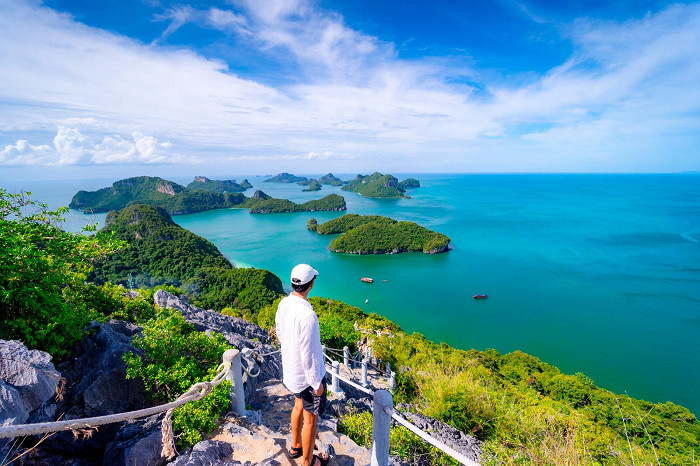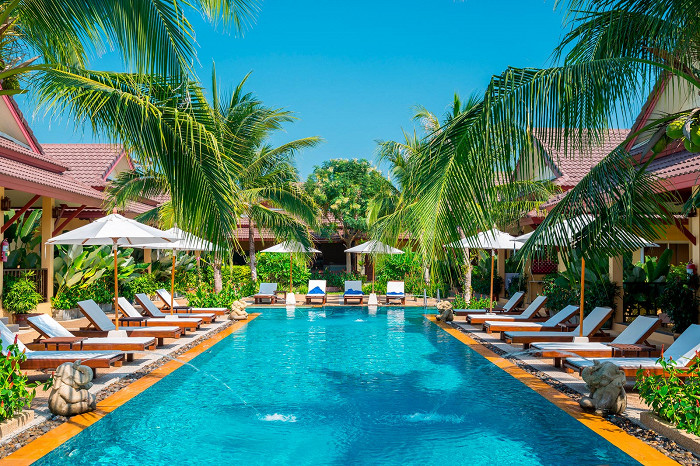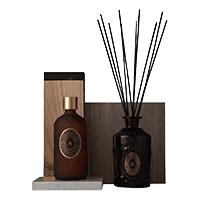 Your shopping cart is empty!
Your shopping cart is empty! Features of holidays in Thailand

A fair amount of tourist experience and a well-deserved reputation as the most popular destination in Southeast Asia make themselves felt: almost everything that can be done or shown to tourists for money in Thailand is done and shown there. On the one hand, it’s cool: the country offers a variety of recreation options with benefit and pleasure, from sex tours and round-the-clock “frenzy” in local bars and discos to diving on the islands and the search for enlightenment in ancient temples. On the other hand, Thailand, where everything touristic has long been put on stream and on a solid commercial basis, can no longer be called exotic. However, despite the apparent mass character and openness of the trend, there is still exoticism in Thailand. It’s just not always available to those arriving on a package tour.
Climate
There are two main types of climate in the country - tropical savanna climate and tropical monsoon climate. The climate of central Thailand can be divided into three seasons: hot - from March to May, with temperatures reaching +42 °C; rainy - from June to October, temperature +26...+32 °C, and cool - from November to February, temperature +18...+32 °C. In the north of the country it is cool in winter, and even cold at night, so it is worth taking warm clothes with you. In the south, it is very humid from March to November; it is better to go there from February to March.
There is no single rainy season in Thailand. Phuket floods in August, Samui floods in November. However, there is no need to be afraid of the monsoon period at resorts: tropical downpours last up to half an hour a day, and the rest of the time the bright sun shines. The velvet season lasts from November to February: the weather is dry and not as hot as in spring and summer. It is better not to go to the north of the country in August-September: heavy torrential rains and wind will ruin the whole impression.
Visa and customs
Tourists from Europe do not require a visa to Thailand for traveling for up to 30 days. You can extend your stay locally for a week or do a “visa run” - leave the country, return to it and get a new stamp for 30 days. In addition, it is worth taking out an insurance policy in advance for the entire duration of the trip. You can bring a carton of cigarettes and a liter of alcohol with you; exceeding the limit will result in a serious fine, and for the import and export of drugs you can even lose your life. More details about visa and customs rules of the kingdom, as well as VAT Refund, are described on a special page about the road to Thailand.
As of November 1, 2018, the import of plastic, including plastic bags and polystyrene foam, was banned into Samet Island in Thailand. Before arrival, tourists will be forced to leave all plastic bags at the airport and, at first, if necessary, they will be given paper bags or bags made of environmentally friendly material. Violators will have to pay a fine of THB 1,500. The same measures are expected to be implemented on Koh Samui soon and throughout the country by 2021.
Transport
Thailand only seems like a small country, but in reality the distances between cities are quite impressive, and trips take two days. But everything, of course, depends on the direction and the chosen mode of transport. Airplanes are fast and convenient, and often it’s also budget-friendly if you make friends with low-cost airline sites. Unusual and colorful - trains. Inexpensive and convenient - buses. Getting to the islands, of course, by water is a whole adventure and a separate pleasure, the only pity is that there are no ferries between the main seaside resorts.
Car rental in Thailand
Renting a car in Thailand is a pure extreme experience. On the one hand, this is an excellent solution for those who plan to move around the country a lot. With your own car, you can conveniently explore the northern beauties of Chiang Mai and Chiang Rai, drive along the beaches of Phuket and visit national reserves throughout the kingdom. On the other hand, local roads are a severe test for an unprepared driver: driving on the left, problems with parking, Thais always in a hurry, ignoring traffic rules by all road users, insolvency of Russian driver's licenses, confusing routes, traffic jams in Bangkok and on the outskirts of it, as well as the law, which always ends up on the side of the Thais. There are two solutions: you can rent a car with a driver or rely on luck and still get behind the wheel yourself.
Communications and Wi-Fi
The largest cellular operators are DTAC, AIS and True. Tariffs are almost the same; SIM cards are sold in company offices and communication stores. You can also connect at Family Mart and 7/11 convenience stores. The cost of SIM cards is from 50 THB to 1700 THB. Incoming calls within the country are always free, outgoing calls cost 1-5 THB per minute. AIS has a special Traveler Sim tariff: packages costing 300-600 THB include 7 to 15 days of unlimited internet, calls with Russia - 4 THB per minute.
You can also call home from a pay phone. The main thing is that the body is green or yellow: red payphones are for local calls, blue ones are for long-distance calls within the country. Cards with a value of THB 250-600 are sold at newsstands, hotels, post offices and convenience stores.
Internet communications in Thailand are well developed. There are many Internet cafes in large cities and resorts; you can connect to the Internet for 1-3.50 THB per minute. Hotels and chain restaurants sell cards with access codes to wireless networks (250-600 THB). Free Wi-Fi in public areas is available for 5 hours per month after registering at the office. website of the AIS operator (English version).

Thailand hotels
Hotels in Thailand are mostly quite cheap and of a good standard. They don’t have any “stars”: tour operators “assign” levels to them in their catalogs, starting from their own, more or less objective ideas. On the islands of Samet, Koh Samui and Koh Chang there are mostly quite modest bungalows, but there are also comfortable 4-5* hotels. For the most part, these are low-rise buildings that harmoniously fit into the surrounding landscape. The bustling resorts of Pattaya and Phuket offer both cozy family hotels and designer boutique hotels for the most discerning guests. In Bangkok there is a place to stay for a budget tourist, a family with children, or a businessman arriving in the heart of Thailand on business.
You should not book dinners at hotels: most likely, you will have to eat alone. During the day and evening, the vast majority of tourists eat in restaurants and cafes, of which there are a great many at any resort.
A bed in a capital hostel will cost from 275 THB per night, while a luxurious room in a 5* hotel will cost from 2250 THB per night. Accommodation in a mini-hotel in Pattaya starts from 590 THB per day, luxury hotels offer their services from 3400 THB per night. A room in a standard three-room apartment in Phuket can be rented for 220 THB per day, while a stay in a prestigious luxury hotel will cost from 1,750 THB per day.
How to avoid problems
Before departure, it is recommended to be vaccinated against cholera, hepatitis A, yellow fever, diphtheria and typhoid fever. It is advisable to have a repellent in your first aid kit: mosquitoes that carry the infection are active both day and night. However, there is no need to worry too much: according to statistics, the risk of contracting a tropical disease or infection in Thailand is extremely low.
It is better not to buy food from street and beach cooks and vendors - poisoning is possible. Products here spoil very quickly, so it is wiser to avoid anything fermented milk. Drinking water is only from bottles, ice for drinks is only in case of emergency: it can be prepared from tap water.
Nudism is completely banned in the country, although toplessness on the beach is far from uncommon. Disparaging remarks, much less insults, against the monarch and the Buddhist faith—the pillars of Thai society—are considered a crime. Serious punishment awaits rowdies on board the plane: if you smoke in the toilet or violate any other prohibition, you can run into a hefty fine.
In 2018, Thai authorities tightened checks on foreigners to identify illegal immigrants. The Russian Embassy recommends that all tourists always carry a passport with them (not a copy or a driver’s license - this is important!). If you do not have your passport with you, or the tourist refuses to present it, the police have the right to detain him until he produces the original document. Checks take place mainly in crowded places: shopping centers, restaurants, bars and discos.
Despite all its beauty, the nature of Thailand is fraught with many dangers. You should not swim in a stormy sea, especially during the rainy season. Swim near coral reefs with extreme caution. Do not touch anything in the water with your hands: a bright pebble at the bottom may turn out to be a poisonous fish. You should go into the jungle in thick shoes that cover your feet: parasitic worms and leeches do not sleep. And there is certainly no need to tease wild monkeys, no matter how cute they may seem.
Beaches of Thailand
The beaches of Thailand attract tourists from all over the world: the ideal landscapes - sea, palm trees and sand - become the backdrop for a variety of activities. During the day you can idly sunbathe on the coast, stopping for diving, windsurfing and Thai massage, and when darkness falls you can go in search of hotter entertainment.
Almost all beaches in Thailand offer sunbeds and sun loungers for an additional fee: about 100 THB per person per day. The exception is hotels with private beaches. Phuket is a “special song”; the local governor has banned the use of sun loungers and umbrellas on the island in order to restore its natural beauty. However, due to strong solar radiation, umbrellas returned, but sun loungers were given a firm no.
The high beach season occurs from November to February. When choosing a resort, you should focus only on your own preferences and expectations: the coast is sandy everywhere, the entrance to the water is convenient, but each region has its own characteristics. Restless Pattaya is a party-goer's paradise, but the sand and water here are quite dirty. Even the cleanest beach - Jomtien - is not even close to ideal. But you can take a ride to the nearby islands - the situation there is better.
The beaches of the Krabi province look much neater: snow-white sand, palm trees, rocks and the azure sea look like they came straight out of a postcard. The most popular resort is Ao Nang, with developed infrastructure and excellent diving and snorkeling opportunities. It is pleasant to relax on Phi Phi and in the areas of Hat Tham Phra Nang and Hat Nopharat Thara.
The famous “The Beach” with Leonardo DiCaprio was filmed in one of the picturesque bays of the Phi Phi archipelago.
In Phuket you can find impeccable beaches, like in Krabi, and crazy entertainment, like in Pattaya. For example, Patong is crowded with hotels, bars, clubs and discos, earning it the title of “Asian party capital.” Cons: dirty water and unkempt coastline. A completely different mood reigns at Kamala Beach, where you can be left alone with pristine nature.Kata Beach is a nice beach with clear water and deep sea.Karon Beach is considered the cleanest in Phuket, but there are poisonous jellyfish here.Bang Tao is popular among wealthy people: relaxation here is comfortable and relaxed, the area is well-groomed, prices are high, but the service is impeccable.
Diving in Thailand
Diving in Thailand is one of the most popular activities. In the east of the Gulf of Thailand you can dive all year round, but the best visibility there is from November to March, in the west - from February to May, the diving season in the Andaman Sea is from November to May. In the sea waters around Phuket there is a chance to see the most outlandish inhabitants. Ko Racha is home to whale sharks and manta rays from January to March. Shark Point Reef is home to leopard sharks (surprisingly peaceful, by the way), stingrays and moray eels. There are dive centers at any Thai resort: both separately and in almost all 4-5 star hotels. Most of them are located in Pattaya and Phuket.
Shopping and shops
Among other things, Thailand is known as a place where you can buy jewelry with precious stones at a profit. In Pattaya, for example, a visit to the jewelry center is usually included in a sightseeing tour of the city. When choosing jewelry, you need to be extremely careful and under no circumstances buy it secondhand, even if the price is very tempting.
In the country, you should beware of buying counterfeit branded and designer items: they may be confiscated by customs at the airport.
Traditional Thai souvenirs include all kinds of elephant figurines, as well as panels, plates and masks with their images (the elephant is a symbol of the kingdom). On plantations in Thailand, teak trees are specially grown, from which everything possible is made - from the same elephants to expensive “piece” furniture sets. Blackened silver items can be an excellent gift: the widest selection is in Chiang Mai. They also sell elegant tableware made from celadon, the famous bluish-green porcelain. It’s worth taking a closer look at pillows made from vulcanized latex—Thai’s “white gold.” Local silk and batik are also good. A souvenir for the most desperate is durian jam: the smelly but tasty fruit is prohibited from being exported from the country, but this rule does not apply to jam. Budget options include hand-painted candles or colorful oiled paper umbrellas. Read more on the shopping in Thailand page.
Cuisine and restaurants of Thailand
Thai cuisine is pure culinary magic, combining the spicy fire of Indian spices, the delicacy of dishes from the French royal court, the consistent quality of Chinese cooking, and the traditions brought by settlers and tribes from Malaysia, Burma and Laos. Seafood, fresh and aromatic herbs, bright spices, unusual soups, even nondescript rice turns into a real delight called “khau phat” in the most remote Thai cafe, and the simple fried noodles “pad thai” will not drag European tourists away by the ears. Look for a pinch of history, a handful of useful tips and a couple of spoons of culinary secrets in the article “Thai Cuisine”.
Holidays and Events
Thais love holidays - noisy, colorful, with grandeur, traditions and processions. You can experience the celebrations at almost any time of the year - festivals of flowers, pineapples, bananas, elephants and durians, mass kite flying, thousands of soaring lights in the night sky - interesting events take place in all provinces and you should miss such events if they fall on vacation, absolutely not possible. It is worth finding out in advance what unusual things are planned at the resort, and then be sure to visit the vibrant festival, which will certainly become the subject of fascinating stories and photo reports. The article “Holidays and Events in Thailand” will help you navigate the most important celebrations of the kingdom.
BUY THAI BALMS FROM OUR WEBSITE






